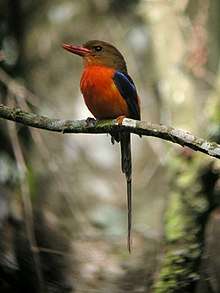Paradise kingfisher
The paradise kingfishers (genus Tanysiptera) are a group of tree kingfishers endemic to New Guinea — with the exception of two species also present in the Moluccas and Queensland.
| Paradise kingfisher | |
|---|---|
 | |
| Brown-headed paradise kingfisher (Tanysiptera danae) | |
| Scientific classification | |
| Kingdom: | Animalia |
| Phylum: | Chordata |
| Class: | Aves |
| Order: | Coraciiformes |
| Family: | Alcedinidae |
| Subfamily: | Halcyoninae |
| Genus: | Tanysiptera Vigors, 1825 |
| Type species | |
| Alcedo dea Linnaeus, 1766 | |
| Species | |
|
see list | |
| Phylogeny | ||||||||||||||||||||||||||||||||||||||||||||||||
| ||||||||||||||||||||||||||||||||||||||||||||||||
| Cladogram based on Andersen et al. (2017). The Kofiau paradise kingfisher (Tanysiptera ellioti) was not included in the study.[1] |
The genus was erected by the Irish zoologist Nicholas Aylward Vigors in 1825.[2] The type species is the common paradise kingfisher.[3] The name Tanysiptera is from classical Greek tanusipteros meaning "long-feathered".[4] The birds in the genus have distinctive long tail streamers.[5]
Habitat and distribution
The centre of paradise kingfishers is New Guinea: Several species occur on this 786,000 km² large island. In addition, there are several island endemisms that occur on islands of the Moluccas and the Louisiade Archipelago. Most paradise kingfishers are resident birds. The buff-breasted paradise kingfisher, which also occurs in the extreme northeast of Australia, moves to New Guinea in the winter half-year. The common paradise kingfisher has the biggest spread among the paradisiacis birds. It occurs in 15 subspecies on New Guinea and islands of the Moluccas and the Louisiade Archipelago. On New Guinea itself, several subspecies of the common paradise kingfisher live there. The remaining subspecies are limited in their spread to individual islands or island groups. The red-breasted paradise kingfisher and the brown-headed paradise kingfisher only occur on New Guinea. The little paradise kingfisher has its residence on the Aru Islands Regency and in the outermost south of New Guinea. It is assumed that the little paradise kingfisher comes from the common paradise kingfisher and developed on the Aru Islands Regency to an independent species. From this place it settled in New Guinea, where today the distribution area of the two species overlaps. These two species do not produce any natural hybrids.[6] The Kofiau paradise kingfisher is also closely related to the common paradise kingfisher, which only occurs on Kofiau.
Species
There are nine species:[7]
- Common paradise kingfisher, Tanysiptera galatea
- Kofiau paradise kingfisher, Tanysiptera ellioti
- Biak paradise kingfisher, Tanysiptera riedelii
- Numfor paradise kingfisher, Tanysiptera carolinae
- Little paradise kingfisher, Tanysiptera hydrocharis
- Buff-breasted paradise kingfisher, Tanysiptera sylvia
- Black-capped paradise kingfisher, Tanysiptera nigriceps – sometimes treated as conspecific with T. sylvia.
- Red-breasted paradise kingfisher, Tanysiptera nympha
- Brown-headed paradise kingfisher, Tanysiptera danae
References
- Andersen, M.J.; McCullough, J.M.; Mauck III, W.M.; Smith, B.T.; Moyle, R.G. (2017). "A phylogeny of kingfishers reveals an Indomalayan origin and elevated rates of diversification on oceanic islands". Journal of Biogeography: 1–13. doi:10.1111/jbi.13139.
- Vigors, Nicholas Aylward (1825). "Observations on the natural affinities that connect the orders and families of birds". Transactions of the Linnean Society of London. 14 (3): 395–517 [433].
- Peters, James Lee, ed. (1945). Check-list of Birds of the World. Volume 5. Cambridge, Massachusetts: Harvard University Press. p. 216.
- Jobling, James A. (2010). The Helm Dictionary of Scientific Bird Names. London, United Kingdom: Christopher Helm. p. 379. ISBN 978-1-4081-2501-4.
- Fry, C. Hilary; Fry, Kathie; Harris, Alan (1992). Kingfishers, Bee-eaters, and Rollers. London: Christopher Helm. p. 8. ISBN 978-0-7136-8028-7.
- "Handbook of the Birds of the World". Retrieved 15 June 2019.
- Gill, Frank; Donsker, David, eds. (2017). "Rollers, ground rollers & kingfishers". World Bird List Version 7.2. International Ornithologists' Union. Retrieved 17 May 2017.
![]()